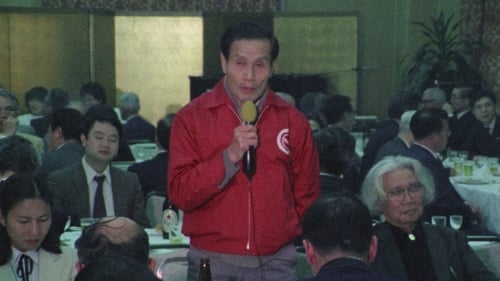
Producer
After years of dumping industrial wastes from the factory to the ocean, Chisso Chemical Corporation contaminated the area of a small Japanese fishing village with excessive amounts of methylmercury. This highly toxic chemical bioaccumulated in fishes of the local water, which when consumed by the local populace resulted in mercury poisoning. In 1977, Minamata disease certification criteria was set by a strange method that tried not to recognize the rights of environmental disease patients. However, an Osaka court won the case for some patients because of a newly developed theory by medical doctors’ recent experiments and proofs. For decades, these patients struggled within the Japanese judicial system for their rights to receive compensation as victims of environmental disease. Those different aspects of these patients’ lives have been filmed by director Hara for the last 15 years, inspired by the late director Tsuchimoto’s documentary MINAMATA: THE VICTIMS AND THEIR WORLD (1971).

Producer
This film is about a lawsuit seeking state compensation for asbestos-related damage in the Sennan area of Osaka. Filmmaker Hara Kazuo records the eight-year struggle of the plaintiffs and their lawyers. A dogged and dramatic depiction of their intense battle.

Producer
When her husband is hospitalized with tuberculosis, Chika has a series of three relationships: with a teacher in her hometown, with a student in Tokyo, and with an aging gangster.

Screenplay
A documentary following the lives of people in Mishima, a small island off the coast of Hagi City, Yamaguchi Prefecture.

Producer
原一男監督が、平成4年5月にガンで亡くなった小説家・井上光晴の晩年の5年間を追ったドキュメンタリー。映画は、彼が文学を教える生徒や、埴谷雄高、瀬戸内寂聴らの証言を通して、井上光晴の文学活動を捉えるとともに、撮影開始直後に発覚したガンと闘う姿を生々しく撮り続ける。

Producer
神戸市で妻とバッテリー商を営む奥崎謙三は、自らを「神軍平等兵」と名乗り、「神軍」の旗たなびく車に乗って日本列島を疾駆する。ある日、自身がかつて所属していた独立工兵第36連隊で、終戦後23日も経ってから敵前逃亡の罪で2人の兵士が処刑されていたことを知った奥崎は、その遺族らとともに真相究明に乗り出す。時には暴力も辞さない奥崎の執拗な追及により、元兵士たちの口から事件の驚くべき真実と戦争の実態が明かされていく。

Herself
In 1972, Miyuki tells her ex-lover Kazuo that she's going to Okinawa with their son. Kazuo decides to film her. He narrates his visits to her there: first while her flatmate is Sugako, a woman Miyuki is attracted to; then, while she works at a bar and is with Paul, an African-American soldier. Once, Kazuo brings his girlfriend, Sachiko. We see Miyuki with her son, with other bar girls, and with Sachiko. Miyuki, pregnant, returns to Tokyo and delivers a mixed-race child on her own with Kazuo and Sachiko filming. She joins a women's commune, talks about possibilities, enjoys motherhood, and is uninterested in a traditional family. Does the filmmaker have a point of view?

Producer
In 1972, Miyuki tells her ex-lover Kazuo that she's going to Okinawa with their son. Kazuo decides to film her. He narrates his visits to her there: first while her flatmate is Sugako, a woman Miyuki is attracted to; then, while she works at a bar and is with Paul, an African-American soldier. Once, Kazuo brings his girlfriend, Sachiko. We see Miyuki with her son, with other bar girls, and with Sachiko. Miyuki, pregnant, returns to Tokyo and delivers a mixed-race child on her own with Kazuo and Sachiko filming. She joins a women's commune, talks about possibilities, enjoys motherhood, and is uninterested in a traditional family. Does the filmmaker have a point of view?

Producer
Kazuo Hara follows the lives and activities of Yokota Hiroshi and Yokozuka Koichi, members of an activist group made up of people with cerebral palsy.







